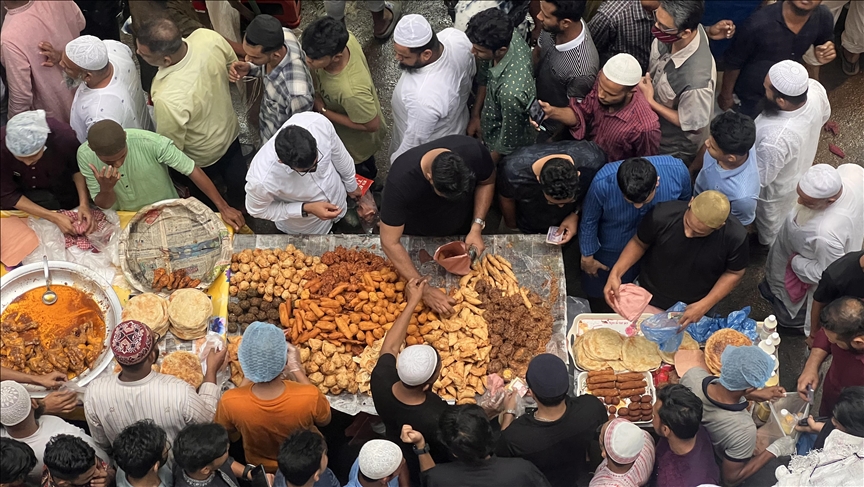Ramadan festivities suffer from skyrocketing prices in Bangladesh
People forced to reduce their food budgets to cope with rising costs, while analysts blame crisis on greedy business syndicates and lax monitoring

DHAKA, Bangladesh
Mohammad Ibrahim Khalil was haggling with a vendor at a floating Iftar Bazar in old Dhaka, where he usually buys food items popular among Bangladeshis during the Islamic holy month of Ramadan.
"We have been buying foods from Chawkbazar Iftar market for generations to break our fast during Ramadan," Khalil, a local resident, told Anadolu. However, the situation is different this year, as prices for all daily commodities, including food for Iftar, have risen dramatically, he lamented.
The floating bazaar, located in front of the historic Chawkbazar Shahi Mosque, is regarded as one of the largest Iftar markets in the South Asian Muslim majority nation of nearly 170 million people.
People come from all over the country during Ramadan to buy from hundreds of food item varieties that carry the fasting month's tradition and food culture. They enjoy the market's hustle and bustle as well as praying at the historic big mosque, which was built in 1664 by Shaista Khan, then-subahdar or head of the provincial administration during the Mughal dynasty in the then-greater Indian subcontinent.
"I'm not sure when Chawkbazar's floating Iftar market first opened. But I remember my father, grandfather, and predecessors coming here to buy Iftar items," Khalil said and explained that the skyrocketing cost of food has forced him to drastically reduce his family's Iftar budget this year.
Many others in the market agreed with Khalil, saying living costs in every sector have nearly doubled in a year, without any significant increase in income.
"For a long time, I bought a chicken once a week to ensure the nutrition of my four-member family. But I've been buying it once a month for the last few months,’ Abul Kashem, a Malibagh resident, told Anadolu.
Kashem, a private job holder, came with his wife to buy some daily-use items from the market, which is popular among middle and low-income people due to the comparatively lower prices of all different commodities.
Kitchen management is difficult
Many housewives told Anadolu that maintaining a family kitchen on a limited income is becoming increasingly more difficult with each passing day due to uncontrolled price rises for food items.
"We're in big trouble," said Yeasmin Begum, a housewife from the Shantinagar neighborhood. "For example, I need a 2-kilogram item, but I can't even buy one kilogram due to the price increase," she explained, before asking, "How can we manage our family in this manner?"
She believed that children are in more difficult circumstances because many families are unable to provide adequate nutrition due to poverty and rising food prices.
"This emerging situation of low protein intake has begun to affect children, women, especially pregnant and breastfeeding mothers, and the elderly," public health expert Lelin Chowdhury told Anadolu, adding that the country's inflation is high and people's economic conditions have deteriorated, worse than during the COVID-19.
“Currently, the level of public health nutrition has been downgraded in Bangladesh,” he said, adding that fruit prices have skyrocketed.
In March, inflation reached 9.33%, the highest level in seven months, up from 8.78% in February, Bangladesh Planning Minister MA Mannan said in Dhaka on Tuesday.
Ordinary Ramadan at Rohingya camps
The holy month of Ramadan for Rohingya refugees in camps in the southern border district of Cox's Bazar still evokes memories of their homeland, Myanmar's Rakhine State, where the persecuted people shared the festivity of the holy month with their loved ones.
"Ramadan was always a great source of joy for us in our motherland. But here we are, in congested camps, depending on limited relief items from donors. Ramadan is no longer as joyful for us as it was in our homeland," a Rohingya refugee Mohammed Alam told Anadolu.
Alam is one of the Rohingyas in Bangladesh’s squalid makeshift camps who lost everything in the last month’s devastating fire at the refugee camps.
Bangladesh is currently hosting more than 1.2 million Rohingya at 33 crammed camps that have also turned the settlement into the world’s largest refugee camp. Most of those persecuted people fled a brutal military crackdown in Rakhine State in August 2017.
Alam said they always dream of returning to their motherland with citizenship rights and due dignity under the UN’s safety guarantee and enjoying Ramadan with their family members.
Lack of accountability
Analysts, however, believe that there are several reasons for skyrocketing prices of daily commodities in the country, particularly during Ramadan.
Ghulam Rahman, president of the Consumers Association of Bangladesh and former chairman of the country's main corruption watchdog, told Anadolu that traders, producers, and refiners sometimes try to make a big profit during Ramadan very unethically.
"During the holy month, businesspeople in many countries, including non-Muslim states, offer significant discounts. However, it appears that business owners here have a somewhat different philosophy… they want to make a huge profit in a single month," Rahman explained.
He proposed swift justice and exemplary punishment for wrongdoers so that they do not commit the same crime again.
Rahman has also suggested ensuring an adequate supply of daily necessities in the market by increasing vigilance against illegal storage, which always creates an artificial crisis during Ramadan.
Referring to the rise in the US dollar value against the local currency and the Russia-Ukraine war, he said, "We import a lot of wheat from Ukraine, but thanks to Turkish and UN efforts, the wheat supply line remains stable.”
Anadolu Agency website contains only a portion of the news stories offered to subscribers in the AA News Broadcasting System (HAS), and in summarized form. Please contact us for subscription options.







